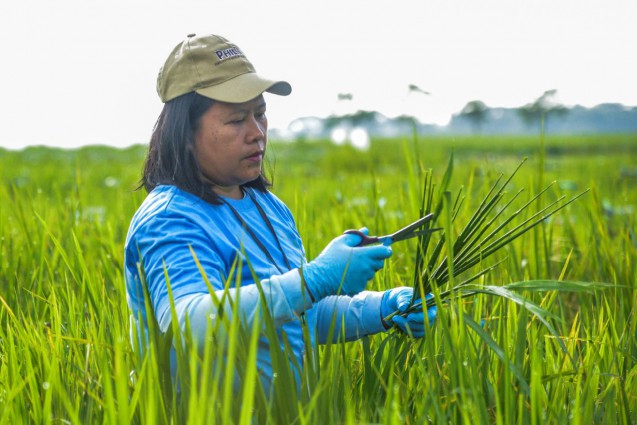
Ate Fely collects study samples to be processed at the laboratory.
Who loves tedious work? Feliciana Cortez loves everything about her task as laboratory aide at PhilRice Central Central Experiment Station. She does laboratory chores, seeding, transplanting, and collecting study samples, which are tagged as dirty works in the research field.
Ate Fely to her peers is the Most Outstanding Laboratory Worker during the 2017 Dangal ng PhilRice award. At 46, she never imagined to receive such recognition.
Outstanding worker
Ate Fely joined PhilRice in 2003 as waitress in the Institute’s cafeteria. When she heard about the vacancy for laboratory aide, she immediately applied for the position and was accepted.
“[My training for this job] was very interesting. I learned how to use microscope, pipettes, and other laboratory equipment,” Ate Fely recalls.
The first few months were hard for as most of the works are new to her. Through time, she had master the tasks.
For work not to pile up, she prepares the samples and equipment before going home. That way, she can start early on data gathering the following day.
Her supervisor, Christopher Cabusora, science research specialist at Plant Breeding and Biotechnology Division, describes her as eager learner. Although being a lab aide entails non-technical tasks, Ate Fely was trained to do semi-technical jobs such as culture media preparation, data gathering (with supervisor), and tissue culture.
Cabusora is proud to say that she is one of a kind lab aide; possessing great dedication to work. He described Ate Fely as responsible, does her job with minimal supervision, and trust-worthy in gathering quality and correct data and in implementing research activity.
“For the last 13 years, she never failed [researchers depending on her output]. Our research team acknowledges her contribution in the development and release of our commercial varieties for fragile environments,” Cabusora says .

Best mother
Outside work, Ate Fely is a mother with two children. As a working mom, she always make sure that she’s home for lunch or dinner. She resides few steps from PhilRice compound.
Fely’s occupation demands more time than you think. When needed, Ate Fely can work beyond 5pm and even during weekends. But for her, a little sacrifice is needed to provide for her family’s necessity as this is their main source of income. She was able to send her eldest to school, Ma. Eloisa Faye who obtained a degree in BS Biology from Central Luzon State University in 2016.
“Having her as a mother is the most precious gift from God, she is not perfect but in spite of those imperfection God designed her to be the best mother for us,” her daughter shares .
Ate Fely used to bring Eloisa at the laboratory. Eloisa witnessed how laborious are her mother’s tasks and this inspired her to be better on her studies.
“Being a laborer is a tough job, their work is taxing but they get little credit for it. Still, laborers like my mother, have the heart to work efficiently and effectively. My mother is also selfless. She sacrificed time and personal desires just to make sure we will have a better future,” she says.
Ate Fely’s success
While working, Ate Fely enrolled to an Alternative Learning System of DepEd to finish her secondary education. After work, she spent hours reading the assigned modules for her to be ready in the next class.
“I do it every night or else I can’t catch up,” Ate Fely, who graduated in 2017, says.
For having a diploma, an employee award, and a college graduate daughter, Ate Fely is already successful. But driven by her dream to have a happy family, Ate Fely promises to do even better.




